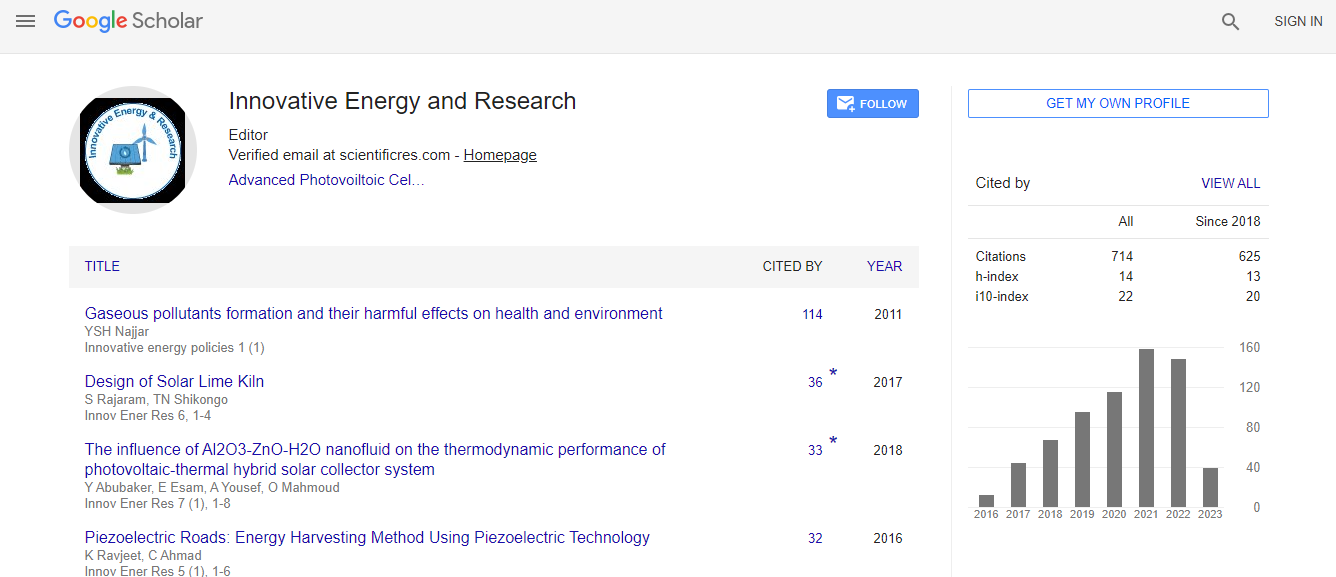Our Group organises 3000+ Global Conferenceseries Events every year across USA, Europe & Asia with support from 1000 more scientific Societies and Publishes 700+ Open Access Journals which contains over 50000 eminent personalities, reputed scientists as editorial board members.
Open Access Journals gaining more Readers and Citations
700 Journals and 15,000,000 Readers Each Journal is getting 25,000+ Readers
Google Scholar citation report
Citations : 712
Innovative Energy & Research received 712 citations as per Google Scholar report
Innovative Energy & Research peer review process verified at publons
Indexed In
- Google Scholar
- Open J Gate
- Genamics JournalSeek
- RefSeek
- Hamdard University
- EBSCO A-Z
- Publons
- Euro Pub
- ICMJE
Useful Links
Recommended Journals
Related Subjects
Share This Page
From waste treatment to resource recovery: A Chicago sustainability story
Joint Event on 2nd International Conference on Renewable Energy and Resources & Energy Materials and Fuel Cell Research
Kuldip Kumar, Albert Cox, Heng Zhang, Thomas Kunetz, Edward Podczerwinski and Debra Shore
Metropolitan Water Reclamation District of Greater Chicago, USA
ScientificTracks Abstracts: Innov Ener Res
Abstract
The Metropolitan Water Reclamation District of Greater Chicago (District) was created in 1889 by the Illinois Legislature. It is a special purpose district that collects and treats wastewater generated by the City of Chicago and 128 suburban communities in Cook County and also has stormwater management authority for the county. The District’s service area is 883 square miles. It operates and maintains seven water reclamation plants with a total design average flow of nearly two billion gallons per day, 22 pump stations, 560 miles of intercepting sewers, 34 stormwater detention reservoirs, seven aeration stations in the Chicago and Calumet River Systems, and the Tunnel and Reservoir Plan (TARP) including 109 miles of deep tunnels and three combined sewer overflow reservoirs with a combined storage capacity of over 20 billion gallons. In 2015, the District received authority to recover resources for resale from its operations to help offset treatment costs. This presentation will provide information on new programs at the District to recover nutrients, and generate biosolids products, energy, and clean water from wastewater and a wide range of other local renewable resources. The District has established a commitment to becoming a sustainable partner in the region by recovering resources, lowering carbon emissions, creating new revenue streams and promoting resiliency.Biography
Kuldip Kumar is a Senior Environmental Scientist with MWRD Chicago. He was more than 25 years of experience in the area of water quality especially fate and transport of nutrients and other environmental stressors like pharmaceuticals and personal care products. For the last 5 years, his research has been focused on ‘Resources Recovery from Wastewater’. He manages the research program on utilizing algae to recover nutrients from wastewater and develop markets for algae biomass based on its characteristics. He has published over 70 research articles/book chapters and has served on many federal grant review panels.
E-mail: KumarK@mwrd.org

 Spanish
Spanish  Chinese
Chinese  Russian
Russian  German
German  French
French  Japanese
Japanese  Portuguese
Portuguese  Hindi
Hindi 
